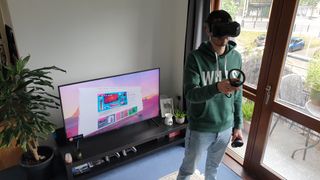Will Meta ruin the metaverse before it even exists?
The fight for control of the metaverse could limit its potential

Half a year has passed since Mark Zuckerberg published an open letter announcing his vision for the metaverse and the rebranding of Facebook to Meta.
Although he painted an attractive picture – “in the metaverse, you’ll be able to do almost anything you can imagine,” we were told – the letter left plenty of room for interpretation, sparking debate over what form this new virtual world might take.
Some have argued the metaverse already exists (at least in its constituent parts), while others say the necessary criteria won’t be met for many years. But broadly, it's understood that the metaverse will consist of a series of interlinked spaces that bridge the physical and digital worlds, thanks to the fusion of traditional and extended reality (XR) platforms.

In his letter, Zuckerberg acknowledged the metaverse “will not be created by one company”, and will demand new models of governance to ensure “more people have a stake in the future”.
He also promised to offer developers and creatives low fees “in as many cases possible”, in order to incentivize innovation and “maximize the overall creative economy”.
However, there are already signs this utopian vision might dissolve quickly under the weight of the monopolistic impulse. Instead, we might end up with a closed-system metaverse presided over by Meta alone, supported by its many services, powered by its server infrastructure and accessed via its Oculus headsets.
But can a metaverse controlled by a single party be considered a metaverse at all?
Are you a pro? Subscribe to our newsletter
Sign up to the TechRadar Pro newsletter to get all the top news, opinion, features and guidance your business needs to succeed!
The question of interoperability
Although the metaverse is expected to enable many new consumer experiences (from virtual concerts to a new breed of online games), it will also be home to business services built to support enhanced collaboration.
One such application is Arthur, a virtual reality meetings platform designed specifically for enterprise use. The idea isn’t for employees to spend their entire working day in the virtual world, but rather to switch fluidly between mediums depending on the nature of the activity at hand.
“In 2022 and beyond, we need to realize the old system was outdated well before the pandemic. The downsides we’re seeing from looking at a screen for ten hours a day has to do with the fact we’re not made to work in 2D, we’re made to operate in 3D,” explained Christoph Fleischmann, Arthur founder.
Whether the full potential of the metaverse can be realized, however, will depend on more than the ability to switch between computing platforms. Equally important is the free movement between services, he told us.

“A critical component will be interoperability; the ability to move property and identity across applications. The moment it becomes a metaverse is the moment we can move from a business-focused service to a social app and back again,” said Fleischmann.
“It’s all a matter of how much we can reduce friction, because openness is key to the metaverse becoming a pervasive technology that everyone adopts.”
Asked whether this level of interoperability is feasible, given the proclivities of the companies making grab for the metaverse, Fleischmann conceded that universal standards will need to be established - and soon.
He also said he expects technologies like blockchain to play a role in decentralizing the governance of the metaverse, enforcing democracy through technological mechanisms that are, in theory, resistant to manipulation.
“It’s an inherently unsolvable challenge for one company to build the metaverse alone,” Fleischmann told us. “Organizations might own parts of the metaverse, a little like countries in the real world, but no one can single-handedly own the metaverse.”
The concern, however, is that the effective standardization will not materialize soon enough to prevent the metaverse splitting into a multitude of mini-verses, each owned and operated by a single organization, and separated by impregnable borders.
Headset wars
Another player with ambitions in the space is HTC, which manufactures the popular Vive series of VR headsets, one of the few legitimate competitors to Meta’s Oculus range.
In a scenario in which Meta has overriding control of the metaverse, HTC risks being pushed aside; the quality of the company’s hardware will be irrelevant, if it’s not supported by foundational metaverse applications.
Speaking to TechRadar Pro at MWC earlier this year, the firm’s Head of Hardware, Shen Ye, explained the metaverse is something HTC has “always been building”, long before it was given a name and elevated into the public consciousness. The implicit suggestion was that no company has the right to own the concept.
Although he wouldn’t be drawn into commenting on Meta’s position specifically, Shen too was eager to emphasize the importance of open standards, both to promote broad hardware support and enable the integration of services from multiple vendors.
“Ultimately, we would love standards to be established. There are W3 standards for the web, but there is not currently an equivalent for the metaverse. We’ll be trying to leverage as many open standards as possible.”

“Our goal is to aim for openness; it’s not about building a closed metaverse – we want other universes to connect with ours. We’re not trying to create a walled garden here.”
Like Fleischmann, Shen gestured towards the potential for blockchain to help support the decentralization of the metaverse. Specifically, he highlighted the role of cryptocurrencies, which disintermediate the payments process, and NFTs, which could help enforce ownership rules in the virtual world.
In a demonstration of its commitment to the idea, HTC recently launched a new crypto-centric XR browser, built atop the foundations of a project abandoned by Mozilla.
“We see Vive Browser as key to the metaverse, enabling experiences across VR, PC and smartphone. Our goal is to have a cross-platform browser that supports Web 3.0 and crypto use cases,” Shen told us.
HTC also recently announced Vive Connect, a cross-platform hub space where people can display their NFTs and other digital assets and launch into virtual events. The long-term strategy, presumably, is to establish the service as a gateway to the metaverse on which users rely.
All the rights noises
So far, Meta has made all the right noises. The company says it wants to collaborate with third parties, help establish open standards, prioritize cybersecurity and privacy, and resist inequitable market dynamics.
However, in publishing the open letter, Zuckerberg implicitly positioned his company (and to an extent, himself) as the founder of the metaverse. In effect, Meta has staked a claim over a digital realm that does not yet exist.
Given the resources and infrastructure at the company’s disposal, and its founder’s alleged preoccupation with the metaverse project, other players in the space are perhaps right to be wary.
What the metaverse will ultimately look like is anyone’s guess, but the story of Big Tech tells us it’s unlikely to be as open, equitable and inclusive as we are told.

Joel Khalili is the News and Features Editor at TechRadar Pro, covering cybersecurity, data privacy, cloud, AI, blockchain, internet infrastructure, 5G, data storage and computing. He's responsible for curating our news content, as well as commissioning and producing features on the technologies that are transforming the way the world does business.
